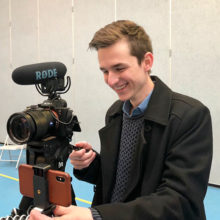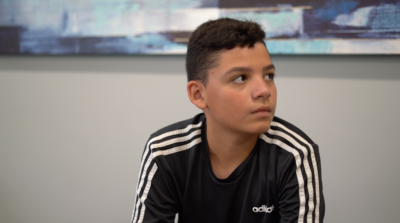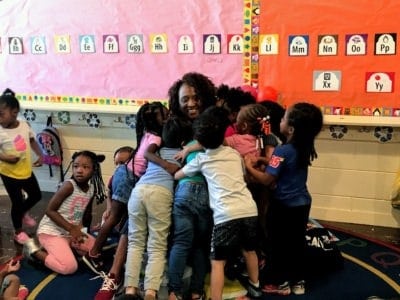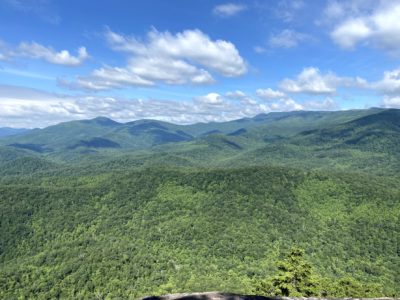
This article is part of the Solution Seekers series. Find the full series here.
Early on a Tuesday morning, Meaghan Lewis and Kevin Maurer sat on either side of a desk, facing their respective laptops and looking at the now-familiar squares of faces that have come to mark the age of COVID-19 and Zoom.
Lewis, the director of programs with Cape Fear Collective, and Maurer, director of community engagement, are coaching a group of high schools students through a program called District C.
The website says District C “is designed to develop a diverse and prepared early talent pipeline in the Cape Fear region of North Carolina. District C Cape Fear is a critical part of the Cape Fear Collective’s broader cradle-to-career talent initiative.”
What it looked like that Tuesday morning was trained coaches, in this case Maurer and Lewis, guiding students through a problem-solving process.
This group of New Hanover County students, the first cohort of District C Cape Fear, includes students from six different high schools in the area. The students are paired with others in a squad, and then each squad is placed with a business. They interview the business, which has a unique problem the students are tasked with trying to solve. Over the course of a week, the students do interviews, brain storm, conduct research, and try to design a solution for said business.
Lewis students’ were trying to help Live Oak Bank. The bank provides its employees with 100% of their health care coverage. It has 625 employees who are full-time, and it wants to help encourage its workers to make healthy choices using their free health care, rather than just convenient ones. So, the students are trying to figure out how to make that happen.
The role of the coaches is just to help get the students pointed in the right direction, according to Maurer.
“It’s a lot of nudging. You nudge the teams. You don’t give them the solution,” he said. “You don’t tell them what to do.”
At the end of the week, the students presented their solutions back to the company they were trying to help.
Kate Groat, director of corporate philanthropy at Live Oak Bank, said she was looking forward to hearing what the students came up with.
“I think it’s a really interesting way of getting students involved in corporate awareness or career awareness even,” she said. “And it helps them develop what people have typically thought of as soft skills, but that we know can be taught — creativity, problem solving, analytical thinking, things like that — in a very real-world setting, and simultaneously solves an existing bank problem.”
Through District C, others, including New Hanover County Schools educators and community leaders, are getting certified so that they can bring this kind of design thinking to their students.
The program already has one cohort of coaches trained. Maurer says that’s a win.
“I look at it like building a house,” he said. “We’ve got the plans, and we’ve built the basement, all right. We’re slowly building the house, but we’ve got the foundation. And that’s a win.”
Cape Fear Collective
District C Cape Fear got started over the summer. It is the first regional partnership of District C, a Raleigh-based nonprofit, with Cape Fear Collective serving as the local partner. But support for the Cape Fear version is coming from the Cape Fear Collective, the organization that both Maurer and Lewis work for.
The Cape Fear Collective website describes the organization as “a collective impact and data science nonprofit backbone organization based in Wilmington, North Carolina. Born out of the corporate sector, CFC’s mission is to scale big data, fundraising, social innovation, and large-scale initiative management to a six-county region in Southeastern North Carolina.”
Lewis puts it much more plainly.
“We kind of coin ourselves as the backbone of backbone organizations,” she said.
Started with seed funding from Live Oak Bank, the organization is not trying to compete with area nonprofits for local funds, so it will be on the lookout for out-of-state or national grant organizations to keep it going.
Part of the reason for that is because Cape Fear Collective’s goal is to support other nonprofits. One way they are trying to do that is through data collection. Data can be a powerful tool for nonprofits, but not every organization has the time or resources to collate the data necessary to really help them move the needle. So the Cape Fear Collective is trying to be that data provider.
Lewis said the Collective has about 300 metrics ready to roll this fall, with more in the works. Basically, they collect the publicly available information that organizations around the Cape Fear region have and put it together in such a way that it’s useful to nonprofits. The kind of data they’re putting together includes information related to health, housing, education, the environment, and more.
The Cape Fear Collective is young. It started in 2019. Maurer had recently left the Wilmington Star-News, where he was a reporter in 2018. He started talking with Patrick Brien, the CEO of the Cape Fear Collective, about the importance of lived experience. Of story. Even when it comes to something dry like data analytics.
“Nobody joins a movement because of a decimal point,” Maurer said. “They join a movement because of the people.”
So, when Brien launched the Collective, he and Maurer were interested in seeing how journalism could be used to explain data and to amplify people’s voices.
There is a whole section on the Cape Fear Collective’s website where this happens. There are articles and podcasts. There’s even a section called “Lived Experiences.”
“We both seized upon the idea of the power of story,” Maurer said. “As a kid, you don’t play with action figures in a vacuum. You create a story around them.”
Story. Support. Data. The Cape Fear Collective is already spread out, but Maurer said its future is even more multi-faceted.
“It’s going to be an octopus,” he said.
Maurer hopes to maybe see District C Cape Fear expand beyond schools. The problem solving framework and coaching platform could be useful in all sorts of areas, not just education. And the data aspect of The Collective will be farther along, with nonprofits knowing that they can come back to the Cape Fear Collective again and again for their data needs.
“(They) can go back to the Cape Fear Collective and say ‘Hey, you showed me this data. Here’s what you told me. What about this? Or, can you help me with this?'” Maurer said. “We start that dialogue. And I think that’s the way you build this foundation of data underneath everything.”
Lewis said that when defining success for the organization, it’s really all about the nonprofits Cape Fear Collective is supporting.
“I think we measure success in the trust we’re able to build in the community,” she said.
The success of the Cape Fear Collective is, in some ways, tied to the success of those it helps. Every new data sharing agreement or institution it supports bolsters the organization’s mission, as does helping nonprofits use data to enhance their ability to get grants.
And if it’s successful, Lewis said she’s hopeful the model can be scaled and duplicated in other areas. There will always be smaller nonprofits that need support, that need someone to help them manage and utilize data, that need the backbone of backbone organizations to bolster their cause, she said. Why can’t something like the Cape Fear Collective work in any other areas where there’s a need?
The website for the Cape Fear Collective says that it is “redefining what a town square looks like.” That it is a place where “all people, organizations, and ideas can come together to effect real, lasting, and systemic change.”
Again, Lewis puts it more plainly.
“Our nonprofits are doing more with less … How can we support them?” she said.
Behind the Story
Alex Granados did the reporting, wrote the story, and shot the footage. Robert Kinlaw produced the video.





